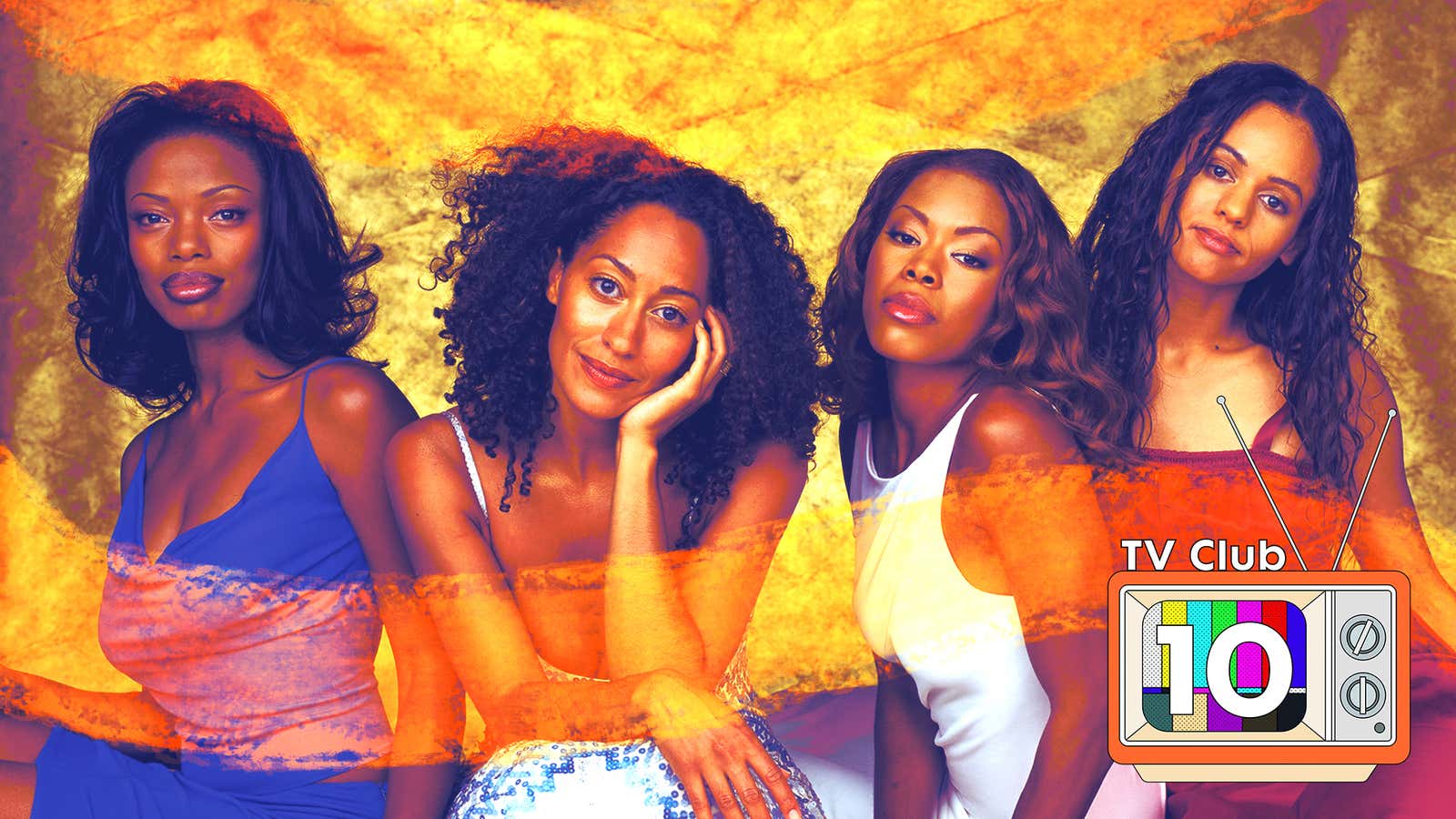As part of the A.V. Club’s Black History Month coverage, here’s another look at our 2020 TV Club 10 celebrating the eight-season sitcom that focused on four Black best friends in L.A.: Girlfriends.
Merely hearing the word Girlfriends still conjures up Angie Stone’s soulful voice and the image of four Black best friends living life in Los Angeles. Joan (Tracee Ellis Ross), the uptight attorney who dreamed of wearing a white dress. Maya (Golden Brooks), the working-class wife and mother turned “authoress.” Lynn (Persia White), the sexually free freeloader. And Toni (Jill Marie Jones), the bourgeoisie real estate broker from Fresno. These four characters made up the friendship core of the legendary sitcom for several seasons.
Series creator Mara Brock Akil, who’d gotten her start writing on shows like South Central, Moesha, and The Jamie Foxx Show, was disheartened by the depictions of Black women and their experiences being Black in America in shows like Sex And The City and The Golden Girls. Living Single, another iconic show created by, for, and about Black women, had ended in 1998, leaving a void in television representation just waiting to be filled. Insert Brock Akil, who teamed up with actor and producer Kelsey Grammer to do just that. The goal of the half-hour comedy, which debuted 21 years ago, was simple: to give Black women a seat at the table.
Along with its iconic theme song, Girlfriends is continuously celebrated for its accurate and relatable portrayal of Black women. This distinction is thanks to Brock Akil and her writer’s room that consisted mostly of Black women approaching Girlfriends almost like “a documentary of our experiences,” tackling everything from colorism and AIDS to domestic violence and cultural appropriation. Despite the humor and at times absurdity rampant throughout the series, Girlfriends avoided trivializing any of these issues. At the core of everything was friendship—just four Black women from different socio-economic backgrounds facing life’s triumphs and challenges together. Well, four Black women and their honorary “girlfriend,” the corny, yet lovable lawyer William (Reggie Hayes).
Girlfriends’ core cast was relatively unknown at the show’s premiere, each member with only a few supporting roles under their belt. But by the end of Girlfriends’ eight-year run, Ross, Brooks, White, Jones, and Hayes were practically synonymous with their characters. Their chemistry onscreen was undeniable, with everyone’s comedic chops on full display. Joan and William delivered the quirky one-liners and hosted themed-parties that’d rival Martha Stewart’s. Lynn never failed to interject with a sexually charged quip or overstay her welcome at someone’s house. A sassy, neck-rolling rant was never far away whenever Maya and Toni were in the same room. Maya was often at odds with Toni, due to the latter’s rejection of anything “from the hood.” One of the series’ best running gags was Toni’s incapability—or reluctance—to remember Maya’s son’s name. It was Jabari, but she called him everything from Jacuzzi to Jumanji. Nonetheless, as the show progressed, Maya and Toni eventually became just as close to each other as they did to the rest of the characters.
Despite the series’ iconic status today, though, critics weren’t exactly impressed when Girlfriends first hit television screens on September 11, 2000. Spike Lee called it stereotypical and criticized the titular foursome, calling them “oversexed and vain.” But with eight seasons on UPN (later The CW) and an equally successful spin-off, The Game, under its belt, Girlfriends is considered one of the most influential TV shows to impact Black culture, serving as both a breakthrough role for Ross and paving the way for shows like Insecure.
The 2007-2008 Writers Guild Of America strike and a subsequent cancellation cut the series’s final season short. No series finale was ever filmed or aired, but ever since the last episode aired on February 11, 2008, fans have called for a reboot or a reunion. The main cast did manage an ersatz reunion in a 2019 episode of Black-ish, on which Ross currently stars, sparking bouts of nostalgia. Beyond that, hopes of a Girlfriends movie have been put on indefinite hold unless a studio is willing to finance it. Rest assured, though, that Brock Akil does have a script ready if (or when!) the time comes.
Many episodes of Girlfriends paint a picture of what the series is all about. But here are the 10 that best depict the sisterhood between Black women that was prevalent throughout the series, highlighting all of the thick and thin moments that color this thing called life. If you want to check them out yourself (or, watch them again), the entire series is about to debut on Netflix—on September 11, the twentieth anniversary of the show’s debut.
“Toe Sucking” (season one, episode one)
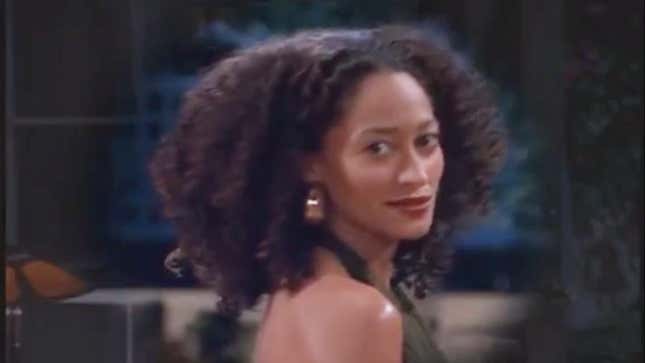
Although Girlfriends wasted no time tapping into serious things like colorism, classism, and sex addiction in season one, the first episode was slightly lighter in tone. Nonetheless, it masterfully introduced viewers to the heart of the series: Black women’s humanity—friendship, flaws, and all. “Toe Sucking” sees Joan turning 29 and questioning the trajectory of her life. She’s got a thriving career, a house, and friends, but no man, which leaves her reminiscing about her ex (Jason George), unofficially known in their group as “toe-sucking Charles.” Fortunately, Charles makes an appearance sooner rather than later. Unfortunately, it’s on the arm of her best friend, Toni, who’s now dating him. Joan’s birthday soirée leads to the first of many blowups between the friends. It’s made clear that Joan is a bit of a pushover. Maya never shies away from speaking her mind (or the opportunity to throw out her signature “oh hell no!” catchphrase). Lynn is the resident peacemaker, and Toni will test the group’s peace at any moment’s notice. Luckily, the love triangle between Joan, Toni, and Charles ends about as quickly as it starts, with the ladies making up and doing what every quartet of friends should do after refusing to let a man come between them: blowing him off in favor of Italian food.
“The Declaration Of Lynndependence” (season one, episode 17)

The series was consistent about Lynn’s resistance to getting a job. That’s not to say her friends never tried to cut her off financially. As “The Declaration Of Lynndependence” showed, Lynn’s damsel-in-constant-distress routine could leave even the most wallet-tightening friend second-guessing whether or not to drop the freeloader in their circle. When Toni finds out that Lynn has applied to yet another Master’s program, she sees it as her chance to get Lynn out of her—and Joan’s—wallet once and for all. Joan initially agrees, but the people-pleaser in her can’t let Lynn stay away for too long. The word “intervention” is used more times in this episode than you can count, but in the end, Lynn’s independence is on hold (for now). But Joan finally realizes that what any functional friendship needs—more than a perpetual “what’s yours is mine” agreement—is boundaries.
“Sister, Sistah” (season two, episode 13)
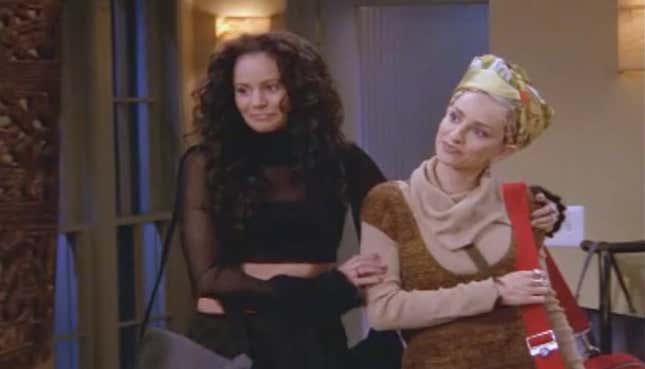
We often refer to friends as the family we choose. But what happens when your chosen family clashes with your biological family? Lynn ponders this question when her sister Tanya (Eliza Schneider) drops in to commemorate the day their parents brought Lynn home. By now, viewers are aware that Lynn is biracial and that her adopted family is white, but there’s a collective gasp heard ’round the world upon the revelation that Tanya is, to quote Maya, a “wigger.” Tanya’s “blaccent” and Erykah Badu-esque hair wrap scores her no brownie points with Joan and Toni. Being her usual chill self, Maya is mostly unfazed until Tanya says the n-word while rapping along to Jay-Z. Girlfriends isn’t the first or last series to touch on cultural appropriation, but it uniquely manages to do so by avoiding generalizations. Forgoing a general “us versus them” approach and placing the conflict between two sisters, Lynn can call out the offense and express why Tanya’s immersion into African American culture and use of the n-word hurts Black people on a personal level. Additionally, the show addresses how hard—yet doable—it is to talk to someone in your inner circle about racism, a point that’s just as relevant today.
“The Pact” (season three, episode 19)
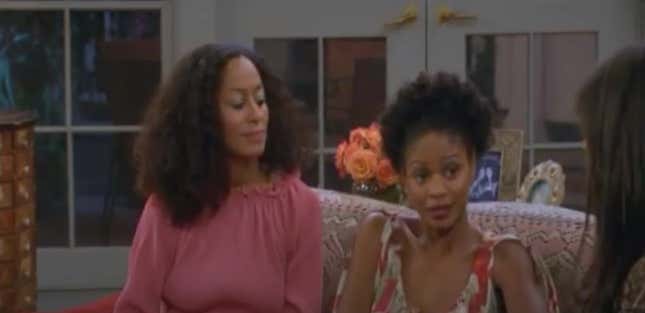
After two seasons of searching for her knight in a shiny Rolex, Toni finally snags the man of her dreams—albeit in a smaller (read: shorter) package than she expected. With Toni’s wedding right around the corner, Joan is overcome with jealousy. As if there wasn’t enough of a strain on their friendship already, Toni kicks things up a notch when she announces that Reesie (Kimberly Elise) is joining her wedding party. Because Reesie “stole” and subsequently married Joan’s college boyfriend, Joan behaves like a grade-A grudge holder, doing everything she can to make Reesie feel unwelcome. But her plans for revenge hit a snag when the quartet learns that Reesie has AIDS—a timeless storyline given that to this day, Black women continue to be disproportionately affected by HIV/AIDS.
The writers manage to cover this issue without being preachy, while still calling out people’s ignorance on how the disease is transmitted—with the help of a kitchen knife. The ladies are cooking dinner at Joan’s when Reesie slices her finger chopping vegetables. Everyone overreacts until Reesie reminds them that the disease isn’t airborne—she just needs to toss the produce and the cutting board. Joan insists that she throw the knife away too, but after some coaxing, it goes into the dishwasher. Later, alone in her kitchen, Joan removes the knife from the dishwasher, promptly tosses it into the trash, and walks away. Not a full minute later, though, she returns, removes the knife, washes it, and places it back into its holder, seemingly realizing that her hangup regarding the knife was rooted more in stigma than safety.
“The Wedding” (season three, episode 24 and 25)
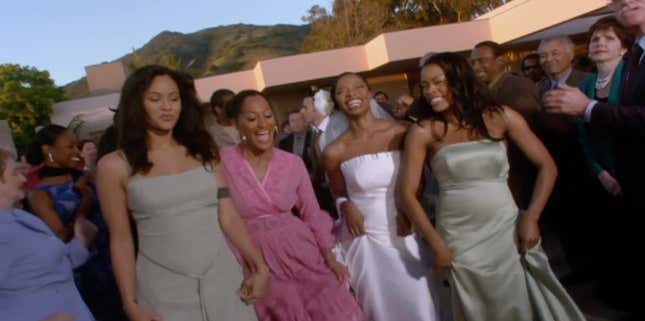
Although Maya and Lynn had called her out on her jealousy toward Toni a few episodes prior, that wasn’t enough to scare Joan straight. Now, it’s Toni’s wedding weekend, and instead of behaving like a model maid of honor, Joan picks fights with her boyfriend Ellis (Adrian Lester). She arrives late to the wedding venue—a mansion in Montecito, California—and frequently drives back and forth to Los Angeles (in traffic!), missing more than one of Toni’s bridal festivities. Up until this point in the series, Toni had been the resident selfish friend, and Joan put up with it. But Toni isn’t as forgiving and kicks Joan out of the wedding party. After talking to Ellis, while moping on her couch, Joan realizes that she’d always prided herself on being a stellar, supportive friend, despite her track record of being terrible with relationships. Following that realization, she hightails it back to Montecito (again) and barges into Toni’s bridal suite, begging to be a part of her big day even if she has to watch from the bushes. A compliment and a heartfelt apology land these two friends back on good terms (for now). Even though Toni cut up Joan’s bridesmaid gown earlier in the episode and she’s forced to wear a mismatched getup, Joan walks down the aisle, finally happy for her friend.
“He Loves Her, He Loves Me Not” (season four, episode 19)
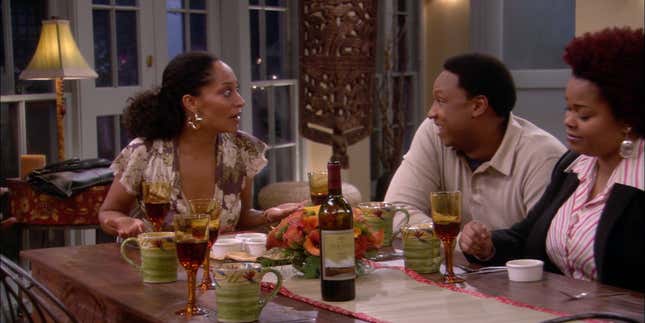
Can women and men be friends? Short answer: yes. But in Girlfriends’ world, apparently not. Joan and William have been platonic besties for years, but according to William’s new girlfriend, Donna (Jill Scott), they may have been ignoring the big, red, flashing “be together” sign. And what she says is not exactly a stretch. From day one, viewers had seen how well Joan’s quirkiness and William’s awkwardness complement each other, so why they’d never had a romantic relationship is a bit of a question mark. The likely answer is that it would ruin what they have if things didn’t work out—throwing off the ethos of the friend group and the series. Despite this warning signal, William strongly considers romancing Joan after Donna’s insistence that the psychic that led William to her may have only brought them together to tell him that he’s really in love with Joan. What. A. Mouthful.
“Great Sexpectations” (season five, episode 14)
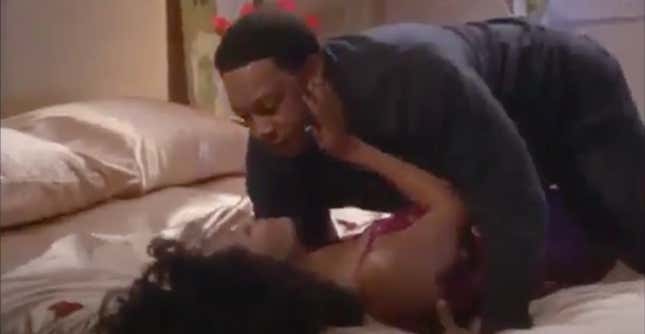
If you were Team “Jilliam” (not an official ship name by any means), you’re in luck. Joan and William eventually decide to give a relationship a go in season five’s “Great Sexpectations,” though their first time having sex doesn’t quite go as planned. After waiting for three months, William is ready to get it on on Valentine’s Day, but Joan is disappointed with his lack of romanticism. To remedy the situation, William hits up a drugstore at 2 A.M. and proceeds to present Joan with a series of “romantic” gifts: a bottle of honey for his honey; a baby (doll) for his baby; and a garden hoe for his… we’ll let you fill in the rest. Despite the great laugh this gesture brings, Joan still can’t get in the mood. Soon, neither can William, and it becomes clear that no amount of porn watching, phone sex, or ambience can compensate for their lack of sexual chemistry. Sure, they love each other, but as friends, and from this episode on, Joan and William commit to being just that.
“Party Over Here”/“Ain’t Nothing Over There” (season six, episode 21 and 22)
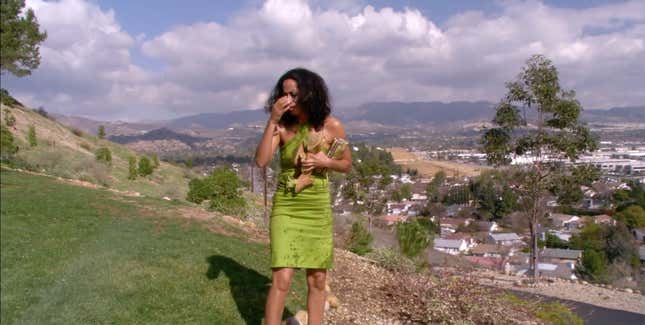
By season six, nothing was the same. Joan had quit her job as a lawyer and opened up a restaurant. Maya was an “authoress” remarried to Darnell (Khalil Kain), the husband she divorced in season three. Lynn met her birth parents and embarked on a music career. And Toni had a baby. A custody battle in this two-part season finale—which marks the final appearance of Jill Marie Jones (Toni), who left at the end of her contract to pursue other opportunities—forever changes the quartet. Caught up in her newfound celebrity status in Los Angeles, Joan fails to show up as a character witness for Toni in court. The night before the hearing, she gets drunk at an A-list party after being brushed off by the other guests. She falls asleep on the lawn of the party’s venue, covered in vomit, and crashes her Porsche the next morning. Rock bottom. Joan then races to City Hall, still hoping to help Toni make her case. But by that point, Toni had agreed to settle out of court with her ex. She takes one final look at Joan before walking off with a disappointed Maya and Lynn by her side, proving that when you’re not there through thick and thin, the friendship, well, ends.
“Bad Blood” (season seven, episode three)
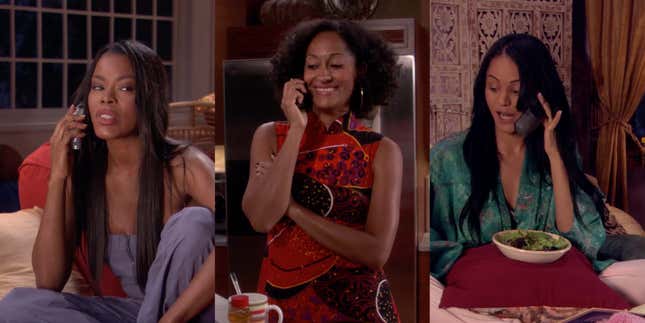
The first season post-Toni struggled a bit to find its footing, and the missing fourth member of the group quickly became the elephant in the room. That elephant remained there, in all its awkwardness, until “Bad Blood,” in which Maya confronts Joan about her controlling ways. Maya, a new homeowner, is proud that she can host fish fries and workout sessions, but Joan isn’t ready to relinquish the hosting responsibilities. On the one hand, the woman just lost her best friend, so her resistance to change is understandable. But on the other hand, resistance to giving a little is what drove Toni out of her life, which a frustrated Maya points out. Unwilling to let their friend group shrink any further, Lynn forces a reconciliation between Joan and Maya, the latter explaining that she only wants the opportunity to pay her friend back for the years of hospitality she gave them. Communication, it works.
“Good Grief” (season eight, episode five)
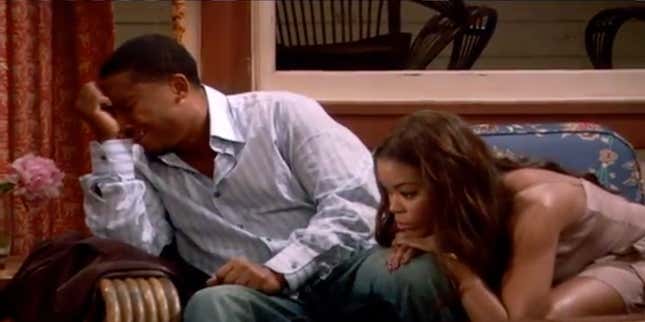
Girlfriend’ shortest season still managed to address serious subject matters with its signature humor and humility. And despite the show primarily focusing on Black women’s lives and experiences, occasionally it did pass the baton to Black men. In “Good Grief,” the fifth episode of season eight, it did just that in the aftermath of Maya’s miscarriage. She’s seemingly doing okay following a week of recovery, but Darnell is struggling. Oblivious to his pain, Maya is eager for them to get back to their lives. They argue before (and after) a dinner hosted by William, where Darnell finally expresses how hard it’s been to deal with the miscarriage due to comments from friends and family members to suck it up. With Maya finally listening and sitting by his side, Darnell is finally able to cry it out. Black men and women are often lauded for being “strong” in the face of injustice and hardship. This episode serves as a beautiful (and timeless) reminder that it’s okay not to be.
